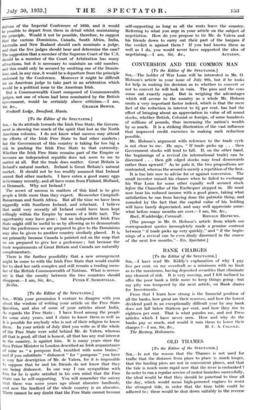CONVERSION AND THE COMMON MAN
[To the Editor of the SPECTATOR.] SIR,—The holder of War Loan will be interested in Mr. a Hobson's article in your issue of July 9th, but if he looks for help in making his decision as to whether to convert or not to convert he will look in vain. The pros and the cons come out exactly equal. But in weighing the advantages which will accrue to the country as a whole Mr. Hobson omits a very important factor indeed, which is that the mere fact of the reduction in interest to 8i per cent. has had the effect of bringing about an appreciation in value of all sound stocks, whether British, Colonial or foreign, of some hundred; of millions of pounds, thus increasing the nation's wealth by so much. It is a striking illustration of the vast influence that improved credit exercises in making such reduction possible.
Mr. Hobson's argument with reference to the trade cycle is not clear to me. He says, " If trade picks up . . . then Government stocks will tend to fall. If, on the other hand, the beginnings of a revival (in international trade) can be discerned . . . then gilt edged stocks may tend downwards rather than upward." As he puts it, the two propositions are contrasted, whereas the second is merely a repetition of the first.
It is too late now to advise for or against conversion. The small investor missed his chance when he failed to exchange his War Loan for some other equally well secured stock before the Chancellor of the Exchequer stepped in. He must now bear his reduced income with a good grace, taking what satisfaction he can from having done the patriotic thing, and consoled by the fact that the capital value of his holding will have barely depreciated, and may well appreciate some- what before many months are over.—I am, Sir, &c., [The passage in Mr. 0. Hobson's article from which our correspondent quotes incompletely made a genuine contrast between " if trade picks up very quickly," and " if the begin- nings of a revival can be even dimly discerned in the course of the next few months."—En. Spectator.]






























 Previous page
Previous page